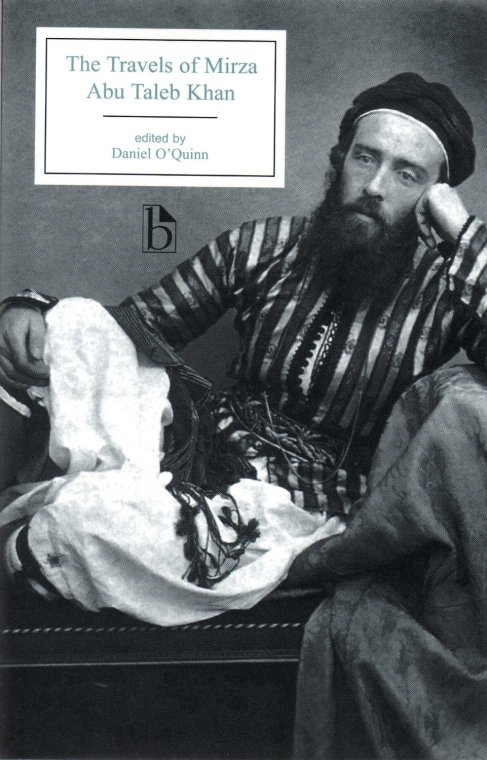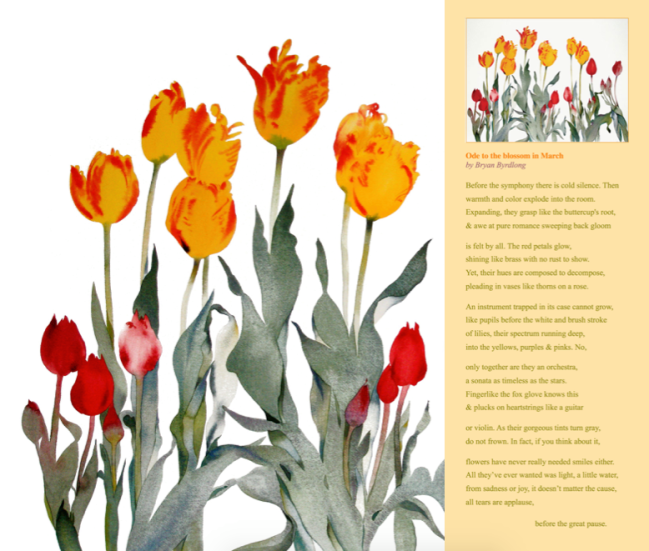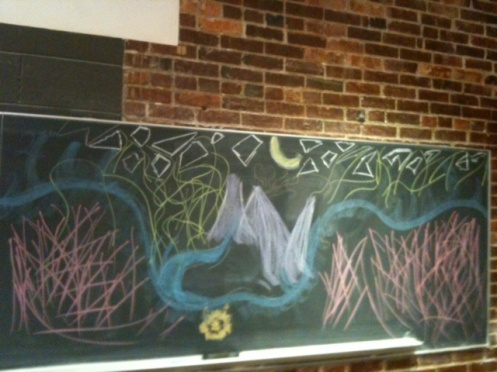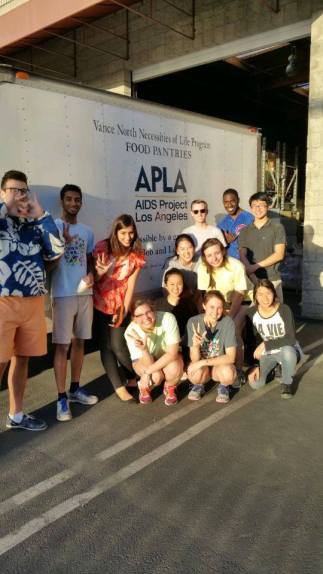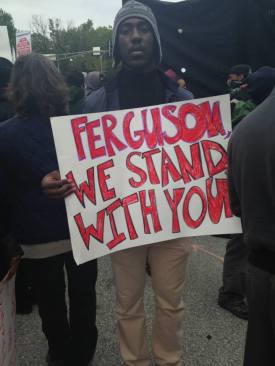
Until very recently, I could say with complete honesty that I had never been harassed by the police. Until very recently, I would tell you or anyone that all the officers that I had personally interacted with had been nothing but helpful. My uncle is a police officer and my cousin, and seeing them in their uniforms always gave me a sense of pride. For a long time, I was never afraid of police officers, but for whatever reason I was always afraid of guns. Perhaps it was because I live on the South Side of Chicago, an area that has recently gotten national media attention for its violence. Growing up in East Morgan Park shielded me from the worst, but as a child I wondered if I or someone I loved would be next. Although, as the years went by it seemed like I was one of the fortunate ones. My house was broken into once, but I do not share the experiences of my friends who were jumped, mugged, or threatened by gang members.
Recently after much reflection, there is only one encounter that I had that could possibly count as police harassment. Although, at the time my friend and I just shrugged it off as a strange coincidence. Once, when I was ten years old, my friend Tevin and I were playing in the front yard. A police cruiser pulled up to us, and an officer got out of the car. He asked if we had been jumping fences which we thought was a strange question because he hadn’t. We said no. He said that there had been boys that were wearing shirts like ours that had been jumping fences, and he had received a call about it. A nearby neighbor corroborated our story and the officer left. That’s it, I’ve never been stopped and frisked, asked if I was buying or selling drugs, pulled over, beaten, tasered, shot at, or remotely threatened by a police officer. Hooray for me.
However, fast forward through my life to the night of October 12th 2014 and everything changes. I had joined a coalition of students from Vanderbilt University (my school), Fisk University, and Tennessee State University to journey to St. Louis sponsored by the local NAACP’s gofundme and Ferguson Action. We were to join up with the national protest of the murder of Michael Brown the next day, but when we got to our hotel we heard of a protest happening that night of another young black man, Vonderritt Myers Jr., killed by a white officer in the Shaw neighborhood of St. Louis. As we rode there in the white vans that we had used for the trip, the police were out in notable force, even barricading some streets. We must have looked suspicious to them because after ten minutes of driving they forced us to stop. Then they shone lights in the car. What happened after that, I will never forget.
They told everyone in the car to put their hands up with the lights continuing to shine in our faces. The tension in the air was palpable. We could barely see outside van, but could tell that we were surrounded by an impressive amount of force. It was then while my hands were up that for the first time I was afraid. I wondered what would happen if someone next to me made a sudden move, a twitch, a sneeze; anything? What’s to stop them from forcing us all out of this van right now? Although, I was afraid, I remained calm. Several people in the van were videotaping the situation and the police with phones and miniature video recorders. They instructed the driver of the first van to get out and explain where we were going. She said that we were looking for the expressway. The officers then talked amongst themselves for a bit before deciding to give us an ‘escort’ to the expressway. The mood in the van was solemn as the lights dimmed; we were able to put our hands down and were led away from the protest.
The next day, I was filled with confusion and the dull sting of anger. One summer ago, when I had helped St. Sabina Catholic Church promote the 2013 Occupy the Streets Peach March on Chicago’s South Side during which we went through four gang territories protesting for peace on our streets, the police had been our escorts. Even during the national protest in downtown St. Louis it was the police who blocked off the streets for us, making sure that we could pass. I was met with a resonate cognitive dissonance. The police had not a day ago terrified me and my friends, but now they were here, intended to make me feel safe. The protests though overall exuberant, ultimately only added to this dissonance. There were people from all walks of life and all over the country. I even ran into Cary Shepherd, a friend from high school. There were people there for an end to police brutality, people there for justice for Michael Brown, people there relating Ferguson with Pakistan, people trying to raise the minimum wage. Communists passed out literature. A man walked around saying that we all had to take the violence to our oppressors. The crowd, me included, sang many chants that day, but the one that stuck out was ‘No Justice. No Peace’; even then I felt that it was foreboding in a way I couldn’t explain.
Ultimately, Officer Darren Wilson was not indicted by the grand jury in the killing of Michael Brown. Many people were upset. There were riots. On my timeline, multiple Facebook friends indicated that they had lost faith in the system. For better or worse, it seemed that our chant had come true. I was upset as well, but more so that there would be no trial, and that for me there would always be a shadow of doubt that injustice had occurred. In our Group-Me a semi-heated discussion broke out from a Fraternity brother who wondered why people were so adamant about Darren Wilson’s guilt given the reasonable ambiguity of what had transpired between him and Michael Brown. Who were we to judge the grand jury’s decision? The law had prevailed and we should just accept it as reality. At that moment, I discovered something both empowered and terrified me. I agreed with him. I agreed that this case in particular was ambiguous, and that it had been sensationalized by the media. I agreed with him that we did not know all of the facts and that there was a chance that the grand jury had indeed made the right decision. I shuddered at the ethical implications of both my feeling of empowerment and my feeling of terror. If nothing was to be upset about, I had been baited by my race and surrendered to the bias of my peers and sensationalist media. On the other hand, if the doubt that was plaguing me was correct then injustice had occurred, then a killer had potentially gone free, then an officer of the law would not be held accountable of their actions. It was then that I realized the problem, my brother and I, were looking at the situation from completely different contexts.
In my opinion context is critical for evaluating police accountability not only in Ferguson, but throughout the United States in terms of race, class, gender etc. A person that sees things in different context not only comes up with a different opinion on a case, but exists inside a different ethical reality. After the grand jury’s decision, I watched different news stories and read multiple articles online where people noted Michael Brown’s bullying behavior, his theft, and his status as a criminal who got what he was asking for. There were people who sided in solidarity with Officer Wilson, and while I personally could not do so, I understood why they could. I’ve known people like Michael Brown, people that beyond allegedly have stolen, have robbed and hurt others, and have been in gangs. Some of these people are members of my family, and therefore I know that if things had gone differently for me I might have turned out like them. If things had gone differently for me I might have done the things Michael Brown allegedly did. For people that side in solidarity with Officer Wilson it is the same thing.
Knowing this, the ethical questions presented by this case were almost overwhelming. The ethics of police accountability and the ethics of grand jury reform, did I really care about those things in the larger context of my country? What about the effects of media sensationalism on everyday people? I had to ask myself difficult questions. Had I been sensationalized into sadness and outrage over this case; sensationalized just my white counterpart with a differing opinion? Was I, as a black person in America, just as likely as a white people of trading my ethical considerations for a groupthink mentality? And If I was, so what? For black people, isn’t this mentality a defensive one that considers America’s racist past and racially biased present? Isn’t it one that ensures that we do not forget lest history repeats itself? Yet, it seemed that with Michael Brown’s death and lack of indictment and then with the Eric Garner’s death and lack of indictment that history would repeat despite our defensive mentality. In the book, “Race and Policing in America: Conflict and Reform” by Ronald Weitzer and Steve A. Tuch the authors argue that the, “coercive crime-control practices that take place in minority communities are often supported by whites because black and Hispanic citizens represent a criminal threat to the larger social order. However, black and Hispanic citizens object to these aggressive practices because they view them as racially biased and unwarranted.” (Warren 1142), thus, two options arise when speaking of police and grand jury reform. Somehow convince the white people that believe in this ‘criminal threat’ that these systems are both racist AND unethical, or convince these white people that these practices are merely unethical to all people.
According to these people, be they White, Black, Latino or Asian, the decision of the Grand Jury not to indict Officer Derrick Wilson is the law and not necessarily indicative of racism. It would be difficult then, for me to convince these people that the entire Grand Jury system is racist. However, it would be easier for me to give an ethical argument for reform. It would be easy for me to argue that, “‘The grand jury is the total captive of the prosecutor, who, if he is candid, will concede that he can indict anybody, at any time, for almost anything before any grand jury.’ 1 This allocation of power is completely at odds with the constitutional responsibilities” (Hall 334) According to Weitzer and Tuch blacks represent a criminal threat to the ‘larger social order.’ Isn’t the key to focus on the larger social order when discussing ethical considerations and policy changes? If white people who agree with the Grand Jury’s decision to not indict Officer Wilson know that, “The rules of evidence that govern trials do not apply to grand jury proceedings, opening the door to illegally seized evidence, coerced statements, and hearsay” (334) then the context becomes an ethical one. They can then see the potential travesty, not in an Officer Wilson being wrongfully pardoned, but through seized evidence and coerced statements, in an Officer Wilson being wrongfully indicted.
At this revelation, grand jury reform seemed easy, but what about the ethics of police accountability? From a racial and ethical standpoint many white people saw Officer Wilson as doing the right thing. From what was presented in the media including Officer Wilson’s testimony, it seemed clear to them that Michael Brown was large, intimidating, and a bully and that Officer Wilson acted in self-defense. These people seemed not to notice the fearful images of riot police accosting peaceful protestors, but instead the fearful images of the Ferguson riots. After I came back to Vanderbilt from a relaxing Thanksgiving Break this year, not two days passed before, on December 3rd, a student had published an opinion piece decrying our Dean for seemingly supporting on campus activities that supported justice for Michael Brown. In this letter to the Dean this student demanded an apology for unprofessional behavior, but also noted, “the “official” university position does not include any mention about the looting and riots occurring throughout Ferguson, which are of much more importance to the city’s well-being than the grand jury’s decision is.” (Ridley) When thinking about the current, greater social order, looters destroying businesses and property have greater impact than an officer being pardoned by a grand jury for self-defense. However, from an ethical perspective this is a failure of accountability on both the part of the jury and the part of the police.
It was the grand jury’s decision not to indict Officer Daniel Pantaleo in the choking death of Eric Gardner that solidified the importance of accountability for a lot more people that were dissuaded by the ambiguities of the Michael Brown case. Beyond the idea of race, there was footage of an officer performing an illegal chokehold on an unarmed man who later died because of said chokehold. President Obama had just proposed body cameras a few days earlier, yet in this case there was video proof and still no indictment. When I first hear the news, I was numb. I didn’t feel angry or sad. I felt nothing. It scared me, I wondered if I didn’t care anymore. I wondered if it was too tired to care. I remember a day later watching John Stewart’s poignant rant on the Daily Show, in which he/his personality expressed continuous disbelief that in the face of all this evidence there was no indictment. In the end, he didn’t know what to say. The Eric Gardner case definitely presents an ethical argument for grand jury reform and added police accountability, but I wonder how much it can really convince people about race. Once again it seemed that an ethical argument was still more compelling to a large part of the population.
I did some research, trying to find which institutions in today’s America could successfully hold the police accountable. Could it be reform to internal affairs? Could it be the imposition of a citizen’s review board? Little did I know that while I was searching, the answer was literally a click away. It turns out that, “the Media, in their daily scrutiny of public agencies, can be a powerful force for police accountability.” (McCoy and Skolnick 521). When I first came upon this theory I was conflicted. Wasn’t the sensationalism of the media something that engendered bias; something that could influence a rational viewer to make more out of a case then what actually appeared to be there? It may, but it is easier to understand how the media could be of service once one has learned more about the nature of policing as an institution in relation to the public. In 1972, a committee of the American Bar Association acknowledged that methods of review and control of the police were “inadequate”. It is said, that the committee cited “incomplete citizen understanding of the discretionary nature of most police work and of the amount of discretion exercised by police as a basic obstacle to developing effective review and control systems.” (525) Reading this I could not help but think of the fact that I had learned that the headlock used on Eric Garner was illegal from newscasts. However, Facebook posts and even YouTubers that I had subscribed to such as Philip Defranco had also raved about merits of body cameras on police as removing ambiguity in situations such as the ones involving Michael Brown and Eric Garner. It was then that I had an epiphany.
It is no longer just the reporters, newscasters, journalists, and editors that make up the Media. It is Facebook, Twitter, Group-Me, Instagram, YouTube, Tumblr, Imgur, and Reddit. It is the fact that I learned about the national march in St. Louis from a Facebook Event I was invited to and that I heard about lack of indictment of the officer that killed Eric Garner from a Facebook post. Media in today’s day and age includes social media, the hub that connects people of all races, ages, and creeds and disseminates information at sometimes frightening speeds. Similar to its function as a catalyst during the Egyptian revolution in 2010, I witnessed through social media as marches were organized seemingly overnight. And, it was not long before I heard chants coming through my dorm window.
The sight was nothing less than incredible. And just as there were people of all colors and creeds in those marches, there were people of all colors and creeds posting the hashtag #blacklilvesmatter on my Facebook timeline. Someone had started the hashtag #crimingwhilewhite, where in theory white people would post stories about how they performed criminal or misdemeanors in front of police officers to little or no consequence in contrast to the harsh punishments received by black people who were only guilty of petty crimes. There were definitely people who held their previous reservations, but suddenly there was an outpouring of understanding not only of the ethical outrage at the police not being held accountable, but an outrage at the racial injustice of the Eric Gardner case. Traditional media and social media working together seemed to have somehow made it all happen. I was elated, but at the same time, I felt guilty.
Often during my internal debates, I felt that it was always easier to argue to white people who didn’t agree with the culpability of race by forgoing that element of the argument and focusing on purely logical and ethical reasons on why the Michael Brown case, Eric Garner, or even Trayvon Martin case was wrong. But, presented now with such a show of solidarity I wondered if I was wrong for choosing the easy way out, and not trying to explain why race was a factor even though it may have been difficult. Sure, if my previous method had worked, similar to the manner in which I mentioned that the grand jury was generally in need of reform, this may have convinced people who didn’t agree about race to agree to reform the grand jury for ethical reasons. However, even if there is grand jury reform this doesn’t remove the effect that racism has in American society, and it doesn’t change the fact that their denial helps it perpetuate it. I felt that I had been willing to take the easy way out, but since the alternative is and will be so difficult, I didn’t know what to do.
I still don’t know what to do. How do I speak to someone about racism when they don’t see its effects like I do; when they occupy a completely different frame of reference? Regardless of the difficulty, I do know that it is a bridge that will have to be crossed. People have been thinking about this subject for some time, and some answers, some clues have surfaced. According to Scheurich in his article, “Toward a White Discourse on White Racism” “Among Whites, the idea that each person is largely the source or origin of herself or himself, that is, individualism, is considered a natural facet of life. This belief, then, is deeply infused in White judgments about the way life works.” (Scheurich 6). If his research is true, which I believe it is, it offers an explanation to why whites may tend not to view race as a factor in certain situations. Especially in America, there is the idea that if you do well it is because of your own actions, and if you are not doing well it is your own fault. Now, don’t get me wrong, I still believe in the ‘American Dream’, but I recognize that it is an ideal, and for many people including myself at one time, it definitely was not a reality. On top of that, it has been found that even, “educated Whites see racism as an individual issue, not a racial group issue.” (6) This differs greatly from the Black perspective, (which I can attest to from my own observations). It is unfortunate that this barrier that exists, but I am given hope by the fact that we know where to begin. There is nothing inherently wrong with anyone having an individualistic perspective, but white people, black people and all people must be taught that, “The problem with individualism, though, is that it hides the inequities in our social structures, especially racial inequities.” (7). these social structures must be viewed with a different paradigm not just by white people, but especially by white people for reform to be viable in a racial context.
When I heard the news that the grand jury had chosen not to indict the officer in Eric Gardner’s death I was numb. For the first five minutes I could feel nothing on the subject but ambivalence, but I struggled to wonder why. It was finals season and I was sick and stressed. That was when I realized that for the first moments in which I heard the news, it could not matter. I was in shock. I had to process it. President Obama had just been talking about body cameras, and that there already seemed like a way around such a preventative measure was almost too absurd to merit my attention. And yet, I watched as my social media networks burst open with a resurgence of videos of Eric Gardner being choked to death and clips of Jon Stewart’s serious response. Nate Marshall, a good friend of mine who allowed me to cite one of his Facebook posts said, “Hey Darnel remember the time cops stopped us walking from my house to my grandma’s house. It was around my birthday and they accused me of selling drugs because I had birthday money. They tackled me in the grass and I spilled my pop. They owe me a pop.” (Marshall) When my emotions finally registered, I didn’t feel angry or sad. I didn’t cry. I didn’t go out and join the marches, but I knew that I had to write this essay on this subject and this subject alone.
I am privileged, to an extent. I am a black, middle class, college educated, American cisgender, man. This is truth. However, this does not stop my friends back home, my family, or my little brother from meeting the same fate as Michael Brown or Eric Gardner. I have an ethical duty to my loved ones and to the members of my community to hold police and the law accountable not only for their ethical deviations but for their racial ones. As someone raised in a collectivist culture like many Americans, I see all of America as my community. And so, while to some, Ferguson, and Shaw and New York may seem like isolated incidents, more than historical context, it is a pure sociological context tells me that they are connected. In America, we are all connected, and despite privilege, I am happy to see more and more of my White friends, Asian friends, and Latino friends join me in solidarity. Promoting a new understanding of race in America will be difficult, more difficult than police or grand jury reform. But, it is essential to ensuring that these cases gradually become extinct. The next time I am on Facebook, I will share a link to Scheurich’s article with all my friends, in my own way of holding the police accountable and bringing light to the reality of racial bias in this country. It is the least I can do.
Works Cited
Hall, John Wesley. “Grand Jury Reform.” Federal Sentencing Reporter 1 June 2008: 334-336. Electronic.
Marshall, Nate. “Hey Darnel remember the time cops stopped us walking from my house to my grandma’s house. It was around my birthday and they accused me of selling drugs because I had birthday money. They tackled me in the grass and I spilled my pop. They owe me a pop. .” Facebook. Dec. 4th 2014. [Dec. 4th 2014. https://www.facebook.com/nate.marshall?fref=ts
Ridley, J. R. “LETTER: The Dean shouldn’t promote politically minded activities.” 3 December 2014. The Vanderbilt Hustler Website. 3 December 2014. <http://www.vanderbilthustler.com/opinion/article_aadac9f6-7b2b-11e4-b846-6313ff29d0d1.html>.
Scheurich, James Joseph. “Toward a White Discourse on White Racism.” Educational Researcher 1 November 1993: 5-10. Electronic.
Skolnick, Jerome H and Candace McCoy. “Police Accountability and the Media.” American Bar Foundation Research Journal 21 June 1984: 521-557. Electronic.
Warren, Patricia Y. “Race and Policing in America: Conflilct and Reform by Ronald Weitzer; Steven A. Tuch Review by: Patrica Y. Warren.” Oxford University Press 1 December 2008: 1141-1143. Electronic.

